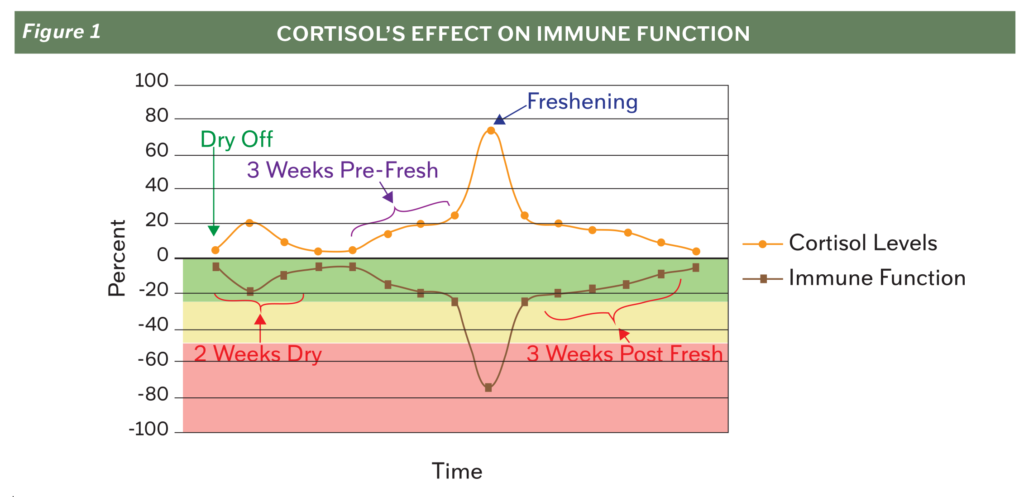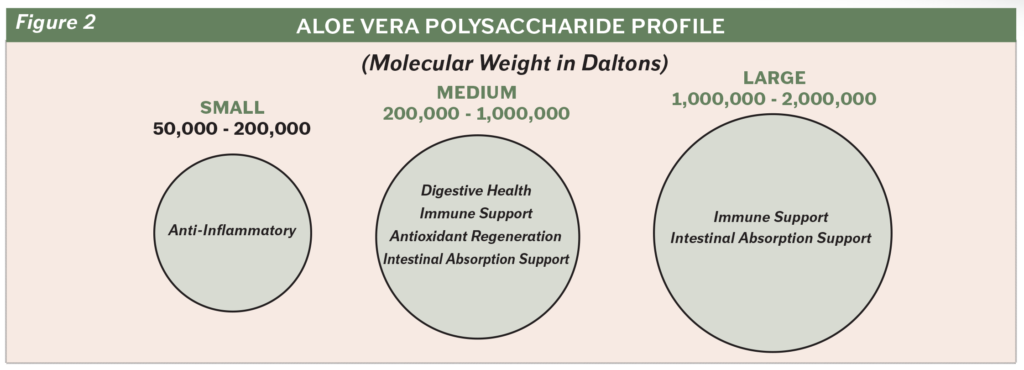How To Determine The Value Of Whole Leaf Aloe Vera For Your Livestock
Click here to view as a pdf: How To Determine The Value Of Whole Leaf Aloe Vera For Your Livestock
By Teresa Marker, B.S.
Stress is defined as a state of strain from adverse or demanding conditions. Livestock can be stressed by many different factors: weaning, pen movement, dehorning, vaccinating, shipping, lactation, weather, flies, etc. Some of these stressors can be reduced by good management, but not all stressors can be eliminated. The immune system of an animal has the ability to resist infection or disease. However, when animals are stressed, they are more vulnerable to disease due to decreased immune function.
Figure 1 depicts the effect of cortisol on the immune system of a lactating dairy cow during freshening. Cortisol is a hormone that is released when animals are stressed. As the cortisol level increases, immune function decreases. Once a stressful event has occurred, cortisol levels will eventually come down but it can take 2-3 weeks for levels to return to normal. During this time, livestock are more vulnerable due to their decreased immune function. Some producers feed medicated feeds to their animals during this time to help prevent a disease outbreak. Treating with these medicated feeds can be expensive, counterproductive to rumen function, and now requires a prescription due to the Veterinary Feed Directive (VFD). Crystal Creek® formulates products that contain natural ingredients and are proven to support livestock during these stressful events.

Crystal Pellets™ and Crystal Creek® Whole Leaf Aloe Vera Juice are two products that contain aloe vera for a flavoring agent. The natural ingredients in these products have been scientifically proven to decrease inflammation, stimulate the immune system along the gastrointestinal tract, promote nutrient absorption in the lower gastrointestinal tract and promote antioxidant regeneration. The complete polysaccharide profile found in the Crystal Pellets™ and Crystal Creek® Whole Leaf Aloe Vera Juice are made up of small, medium, and large molecular weight molecules. The polysaccharide’s molecular weight is very important and helps to determine what body system the polysaccharide supports. Figure 2 shows the breakdown of Aloe Vera’s polysaccharides according to their molecular weight and the area of effect each molecular weight molecule has on the animal’s immune system.

Not All Aloe Products Are The Same
Unfortunately, some companies are marketing aloe with a confusing lab test called the Methanol Precipitable Solids (MPS) test. The MPS test measures total precipitable solids and sugars within a product. The MPS test does not accurately distinguish between the active polysaccharides contained in an aloe product. That is to say that a product can have a high MPS test but have low amounts of active aloe polysaccharides, resulting in poor overall function.
Crystal Creek® has tested a competitive aloe from a manufacturer marketing their product with the MPS test. Crystal Creek® used an independent third-party lab with the approved testing method of high performance liquid chromatography (HPLC) on the competitive aloe sample. HPLC testing can separate the polysaccharide molecules to tell what sugars come from the aloe plant and provide the quantity of each polysaccharide present. The HPLC test results of the competitive aloe product showed that over 50% sugars present in the product were not of aloe origin. That means sugars were added to the product from an outside source. The addition of sugars to a solution will increase the MPS test value.
The International Aloe Science Council (IASC) is an international committee that is compromised of scientists from around the world that specialize in aloe science. The IASC has formally rejected the MPS test and has issued the following statements to consumers to protect them from companies using the MPS test to market their product:
- “The IASC does not endorse the MPS and is discouraging the use of the test as the basis for a label claim.”
- “The Ethics and Science & Technology Committees of the IASC, together with the Board of Directors of the IASC is working together with regulatory agencies and law enforcement officials to protect the public from such fraudulent activities. Until these efforts are completely successful, a detailed knowledge of the scientific and technical aspects of aloe polysaccharides is the best protection against fraud and misrepresentation.”
Manufacturing techniques can vary and can significantly impact molecular weight distribution and retention, thus impacting the performance of products. Crystal Creek® prides itself on thoroughly testing our aloe products with methods approved of by the IASC.
All Crystal Creek® Aloe Sources Are:
- Compliant with the International Aloe Science Council’s standards
- Subject to quality control testing with HPLC analysis (both from the manufacturer and our own internal quality control testing protocol)
- Tested for a confirmed molecular profile and the amount of each active polysaccharide compound
- Certified organic
Choosing the right aloe is more than just buying on price. Purchasing an aloe product that is backed by recommended IASC scientific testing will assure your animals are receiving a quality, proven nutritional support. Crystal Pellets™ and Crystal Creek® Whole Leaf Aloe Vera Juice are designed to be used for strategic situations, meaning that they should be used for specialized, short-term nutrition to support animals during times of specific challenges. To learn more about these products and how they can be used on your farm, call Crystal Creek® today.
